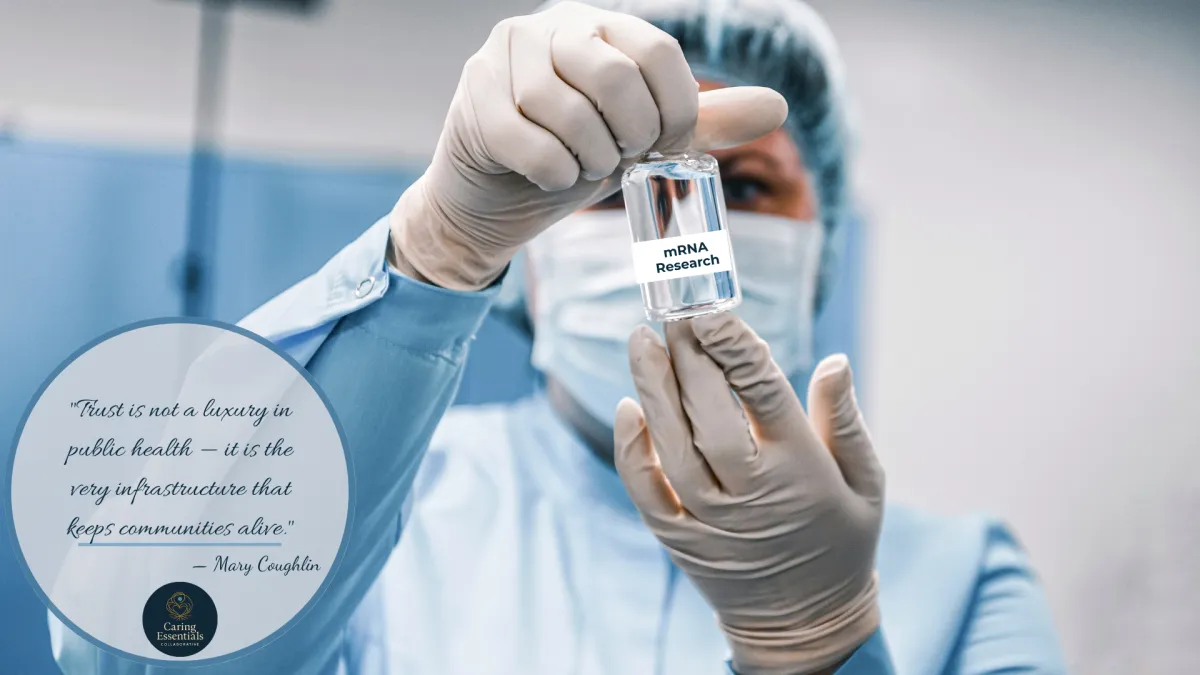
When We Undermine Science, We Undermine Trust — and Lives
"Trust is not a luxury in public health — it is the very infrastructure that keeps communities alive." - Mary Coughlin
When We Undermine Science, We Undermine Trust — and Lives
Trust Is a Public Health Intervention
Frameworks Matter — in the NICU and in Public Health
(A Trauma-Informed Reflection on the RFK Jr. mRNA Funding Cuts)
Last week, Health and Human Services Secretary Robert F. Kennedy Jr. announced that the administration is canceling nearly half a billion dollars in contracts for next-generation mRNA vaccine research. For many, this may have felt like a distant policy decision — abstract, political, maybe even irrelevant to daily life.
But if you’ve ever held a premature baby in a NICU, if you’ve ever watched a family teeter between hope and heartbreak, you know: decisions like this are never abstract. They ripple into real lives, real outcomes, and real futures.
Trust Is a Public Health Intervention
In trauma-informed care, we talk about trust as a determinant of health. Families who trust their care team are more likely to engage fully, follow care plans, and find hope in the midst of fear. The same is true on a national scale: when public leaders undermine trust in science, it doesn’t just change opinions — it changes health outcomes.
Kennedy’s announcement is wrapped in what Paul Offit, one of the most respected vaccine experts in the world, calls “sciencey” language — using terms like antigenic shift incorrectly, citing fringe research sources, and leaning on misinformation.
This isn’t just about disagreeing on policy. It’s about dismantling the very frameworks that protect us.
Frameworks Matter — in the NICU and in Public Health
One of the pillars of the B.U.F.F.E.R. framework is Frameworks — the systems of knowledge, values, and practice we use to guide decisions under pressure. In the NICU, abandoning evidence-based frameworks for care can cause immediate harm. In public health, abandoning them can cost millions of lives.
mRNA vaccine technology is not perfect — no intervention is. But its track record during COVID was extraordinary: saving millions of lives, preventing countless hospitalizations, and doing so in record time. Cutting off funding for its development doesn’t make us safer. It makes us more vulnerable to the next pandemic.
The Parallels to Trauma-Informed Care
Trauma-informed care is about buffering the impact of stress before it becomes toxic. In pandemic preparedness, the same principle applies:
Anticipate threats before they overwhelm systems.
Strengthen protective factors — in this case, rapid-deployment vaccine platforms.
Act on credible science, not fringe beliefs, because lives depend on it.
When we fail to buffer against predictable harm, whether in a NICU or a nation, the consequences are both preventable and profound.
Why Language Matters
One of the talks I give is called Words Matter, because they do. Language can heal or harm. Kennedy’s statements give the appearance of being grounded in science, but in reality they distort scientific concepts to fit a predetermined belief. That’s not curiosity, and it’s not transparency. It’s manipulation dressed up in medical jargon.
In clinical care, this would erode trust instantly. In national health policy, it risks eroding trust for generations.
A Call to Action
The truth is, the stakes here are both deeply personal and undeniably global. The same principles that guide trauma-informed developmental care — trust, truth, and protecting the vulnerable — must also guide our public health decisions.
Because when we undermine science, we undermine trust.
And when we undermine trust, we undermine lives.
So, whether you’re at a bedside, in a boardroom, or in a voting booth, remember: your voice matters. Your advocacy matters. The future depends on leaders — in every sector — who are willing to act from a place of evidence, compassion, and courage.
Reflection Prompt:
Think of a time when trust in science or care was broken for you — personally or professionally. What helped you rebuild that trust? How can you be a buffer against misinformation in your own sphere of influence?
In relentless pursuit of truth and trust,
Mary
